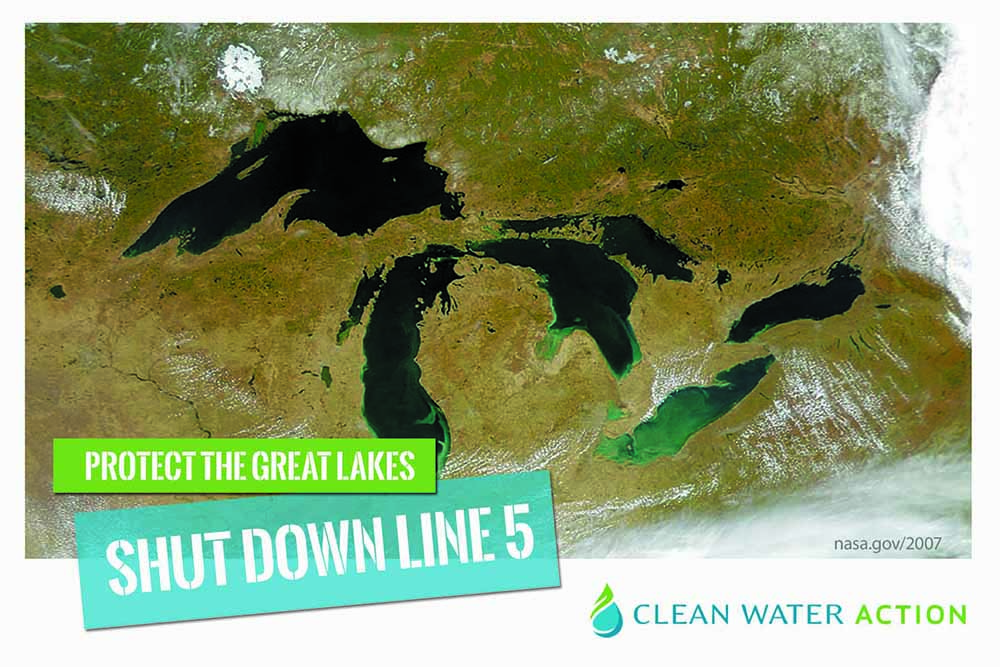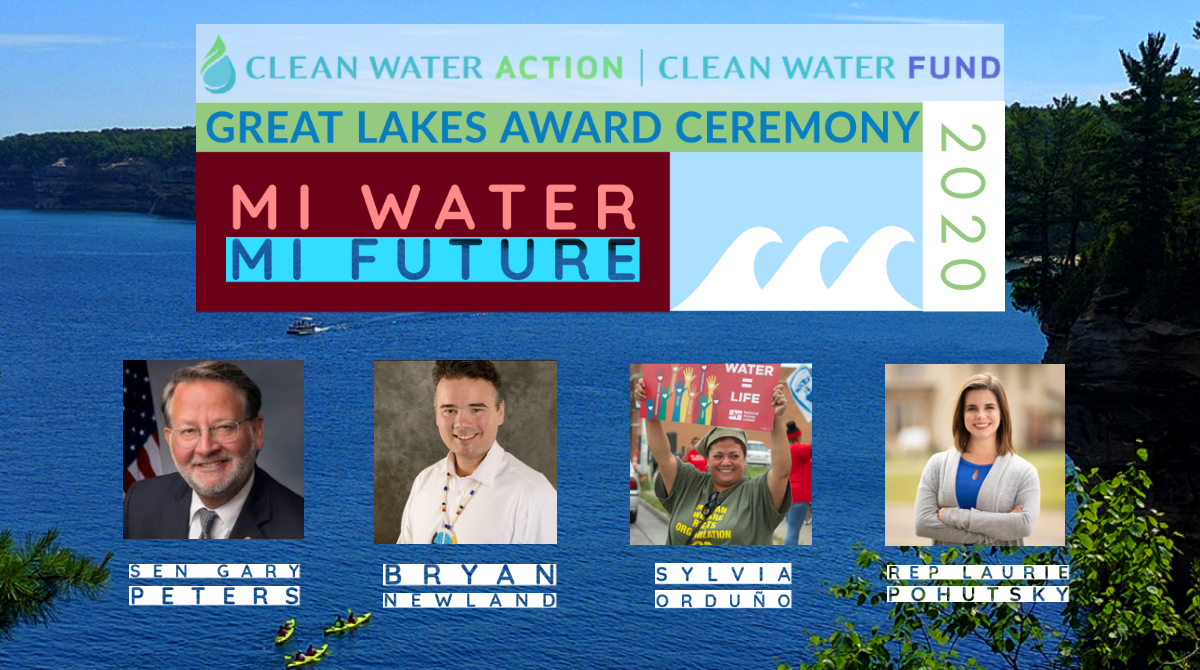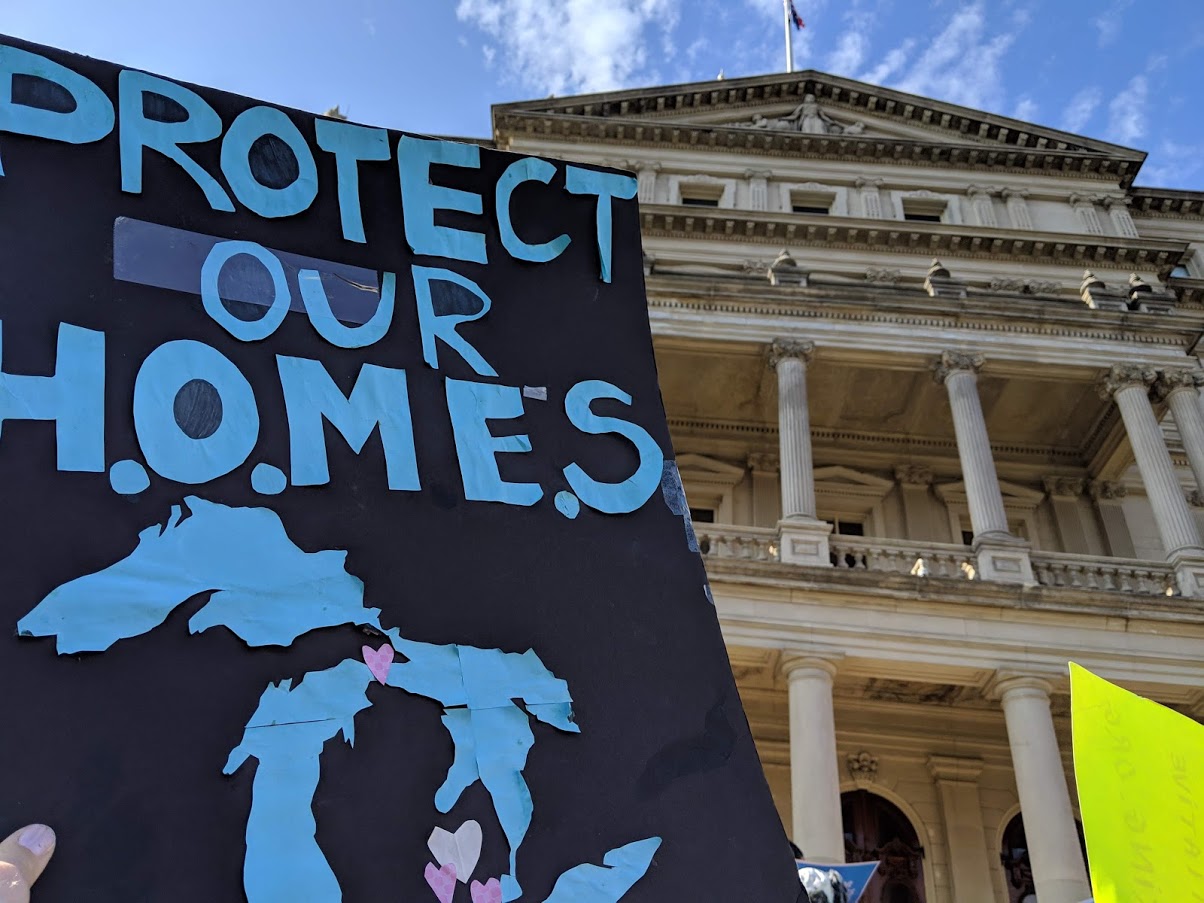In This Issue
- The Path to the White House Runs Through the State of Michigan
- Voting Safely in Michigan
- The Road to an Environmental Majority in the Michigan State House
- Line 5 Tunnel Permits Move Forward, Despite Major Concerns
- 2020 Great Lakes Awards Celebration
- Download a PDF of this issue
The Path to the White House Runs Through the State of Michigan
In 2016, Donald Trump won this State by fewer than 11,000 votes. Over the past 3 and half years, President Trump has made dismantling critical environmental and public health policies a centerpiece of his administration. He lacks the moral and ethical clarity needed to tackle the monumental threat of climate change. He disregards science. He incites violence against communities of color. He knew about Covid-19 but failed to respond. And he blatantly attacks our democracy by spreading disinformation. Our climate and democracy can’t afford another four years of a Donald Trump Presidency.
In July, Clean Water Action endorsed Joe Biden for President. Joe Biden will restore decency to the White House. Joe Biden and Kamala Harris believe in science. They believe that everyone in this country has a right to safe, clean water. They will tackle climate change, undue the harmful rollbacks of the Trump Administration, seek justice for communities of color most disproportionately impacted by environmental racism, and restore faith in our democratic institutions.
Last week, vote-by-mail ballots were sent out by clerks across Michigan. There are roughly 5 weeks until Election Day. That’s a lot of time to complete your ballot, mail it back in or drop it off, or make a plan to vote early in person or on Election Day in person. Whether you cast your ballot by mail or vote in person this year, we urge you to vote. Vote like the planet and clean water depend on it. They just may.
In Michigan, Clean Water Action has endorsed a number of candidates at the Congressional, State House and County level. To see a full-list of our endorsements, please go to cleanwater.org/voteMI.
Voting Safely In Michigan
Due to the pandemic, Clean Water Action is encouraging members to vote by absentee ballot. Absentee ballot applications can be submitted online or by mail (must be received by your township or city clerk no later than 5 p.m. on Friday, October 30th) or in person at your clerk’s office until Monday, November 2nd at 4 p.m. Ballots can be returned by mail or directly to your clerk’s office or official dropbox. Go to the Michigan Voter Information Center at mi.gov/vote to register, find your clerk, track your absentee ballot, and more!
The Road to an Environmental Majority in the Michigan State House
In 2019 and 2020 several pieces of vital legislation were introduced in the Michigan legislature.
- Bills to restore the state’s polluter pay program and begin holding corporations accountable for the harm they do to our water, air, and land.
- Three separate packages of bills that would have ensured that all Michigan residents have access to safe, clean, affordable drinking water.
- A bill to increase Michigan’s renewable energy portfolio standard to 100% by 2040.
- A package to strengthen public trust protections for our water.
Had any of these bills passed, it would have been a game-changer for protecting our Great Lakes and environment - however not one of these bills received as much as a committee hearing.
This has been a major problem in Lansing for a long time. Sensible bills to protect Michigan’s most valuable resources simply cannot get hearings in legislative chambers with anti-environment majorities. This year, the Michigan House of Representatives is closer to having an environmental majority than it has been in a very long time. Clean Water Action has endorsed many candidates for Michigan State House running in key districts that could make the difference between passing strong environmental policy in the State House, and maintaining the anti-environmental status quo.
Regardless of party, Michiganders understand the importance of the Great Lakes. For decades the Republican leadership in Lansing has turned protection of our Great Lakes and water resources into a partisan issue. They have passed laws giving polluting corporations control over environmental rule-making and permitting, cut funding for environmental enforcement, and made it easier for corporations to take our public-owned water and sell it to the highest bidder. Changing the policies that have negatively impacted public health and the environment for decades starts with changing who is in control of the legislature.
Ensuring that every resident has access to safe, clean, affordable drinking water, and making corporations pay to clean up the messes they make should not be partisan issues.More than 70% of Michigan voters support polluter pay laws, and a similarly high number agree that people should have access to water regardless of income. The power of corporate lobbyists to control decision-makers in Lansing is a major part of the problem - to overcome it, we have to elect leaders who care more about their constituents than the corporations who can fund their campaigns. Find the environmental champions running for office in your community here!
With the challenge of a global pandemic, Clean Water Action’s field team has shifted efforts from knocking on doors to mobilizing members and voters through phone and texting campaigns. Since pivoting canvass operations from field to phone, organizers have contacted hundreds of thousands of voters engaging them in conversations regarding vote-by-mail and endorsed candidates up and down the ticket. This year has presented unexpected challenges to our fight. However, Clean Water Action’s canvass team has risen to meet this challenge head-on and continues to fight for our water.
Line 5 Tunnel Permits Move Forward, Despite Major Concerns
On December 11, 1971, a shotgun-like blast came from a water intake tunnel under construction beneath the bed of Lake Huron. The blast killed 21 workers, and remains one of the worst industrial accidents in Michigan history. Today, the Michigan Public Service Commission (MPSC) and Department of Environment, Great Lakes, and Energy (EGLE) are considering permit applications for another tunnel - one with a larger diameter that must be built through more challenging geology. It’s also more poorly planned than the disaster of 1971.

Before applying for permits for their proposed oil tunnel through the Straits of Mackinac, Enbridge completed geotechnical borings in the Straits to determine what might be encountered during the tunnel drilling process. The boring samples are key because unknown changes in geology are among the most hazardous problems that can be encountered in building a tunnel. In the 1971 tunnel disaster, a drill bit hit an unexpected pocket of methane, which filled the tunnel and exploded when the drill bit fell to the tunnel floor creating a spark.
According to tunneling experts, understanding the geology that a project will drill through is key to a project being done safely. It is apparent that Enbridge has not done the necessary research. Enbridge drilled one boring hole for every 1,000 feet of the Straits crossing. Experts, including one of Enbridge’s own consultants, recommend drilling boring holes every 50-200 feet before tunneling. Even when full geotechnical analysis has been completed with bore holes every 50 feet, unidentified geological factors can make a tunnelling project more hazardous and unpredictable.
Enbridge has done roughly 1/10th of the research necessary to successfully tunnel through any geology, let alone the hazardous and unpredictable geology of the Straits of Mackinac. EGLE should not have accepted the permit requests as “administratively complete". Moving forward on the tunnel is a foolhardy endeavor that risks the lives and well-being of anyone who might work on the tunnel and also continues to risk the most ecologically sensitive part of the Great Lakes - the Straits of Mackinac.
EGLE is accepting public comments on the proposed Line 5 tunnel application through October 19th. Make your comment today!
2020 Great Lakes Awards Celebration

Clean Water Action hosted its annual Great Lakes Awards Celebration on September 17th. Though it looked a bit different this year - our first ever virtual celebration - the event was still a great success! More than 100 members and friends joined the virtual event to celebrate and honor the 2020 award recipients. This year's honored guests were US Senator Gary Peters (who also gave an inspiring keynote address), Chairman Bryan Newland, State Representative Laurie Pohutsky, and drinking water activist Sylvia Orduno. Congresswoman Rashida Tlaib also joined as a special guest and led the group in a laugh-filled trivia game where we learned some fun and interesting things about our honorees!
Congratulations again to the award recipients - we appreciate your commitment to protecting Michigan’s precious water resources. With the support of all our generous supporters, we successfully exceeded our fundraising goal. A very special thank-you to all our sponsors.
We look forward to seeing everyone in person next year!
Special thanks to our event sponsors for their generous and ongoing support of our work
5 Lakes Energy
Ann and Alan Frank
Anne and Tom Woiwode
Christy McGillivray
Curt and Carol Moultine
Curtis Hertel Jr
Cyndi Roper
Dan O'Neil
Dave Woodward
Deborah Miesel
Emily Gobright
Frank Wesser
Greater Lansing Labor Council
IBEW Local Union 252
Jeff Kingzett
John Hunting
Jon Hoadley
Kate and Jeff Koeze
Kent and Mary Johnson
Little Traverse Bay Band of Odawa Indians
Lori Lutz
Michigan Environmental Council
Mike Berkowitz
Mike and Ann Brady
MotorCity AutoGlass
Pat Lindemann
Paul Pratt and Denise Chrysler
Progress Michigan
Rosemary Bayer
Sam Singh and Kerry Ebersole-Singh
Terri Wilkerson
